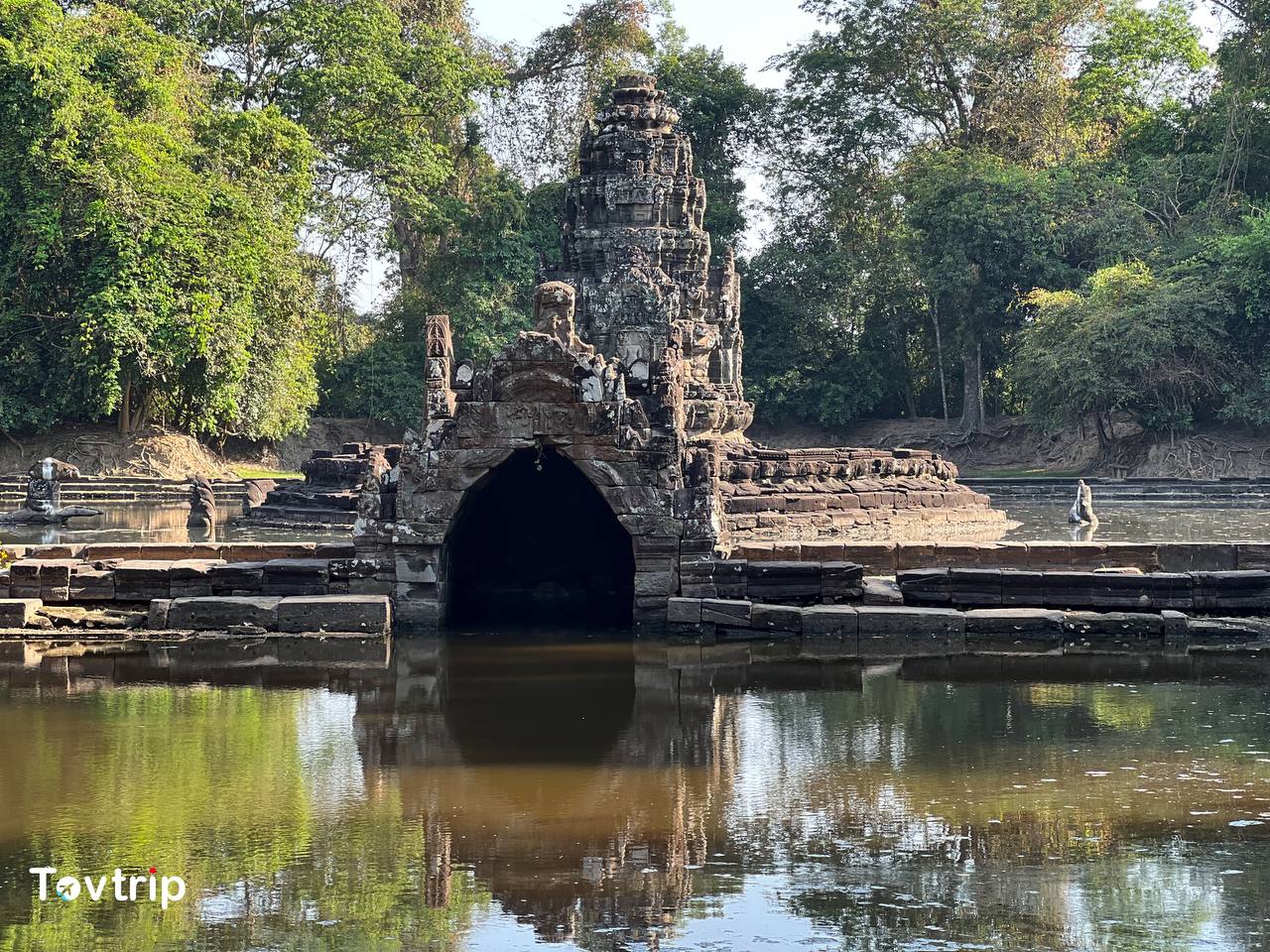
ប្រាសាទបន្ទាយក្តី (Banteay Kdei Temple)
-
 By
Local-guide N003
By
Local-guide N003
- Date 13 Apr 2023
ប្រាសាទបន្ទាយក្តី មានទីតាំងស្ថិតនៅជាប់នឹងប្រាសាទតាព្រហ្ម ជ្រុងអាគ្នេយ៍ក្នុងភូមិស្រះស្រង់ខាងត្បូង បើធ្វើដំណើរតាមផ្លូវខាងកើតអង្គរវត្ត ត្រូវកាត់តាមប្រាសាទក្រវ៉ាន់ ។ប្រាសាទបន្ទាយក្តី ត្រូវបានកសាងឡើងដោយព្រះបាទជ័យវរ្ម័នទី៧ ក្នុងសតវត្សទី១២ ឧទ្ទិសថ្វាយ ព្រះពុទ្ធសាសនាមហាយាន ។ប្រាសាទនេះមានលក្ខណៈស្រដៀងគ្នានឹងប្រាសាទតាព្រហ្ម ប៉ុន្តែមានទំហំតូចជាង និងមិនសូវស្មុគស្មាញ មានខ្លោងទ្វារចំនួន២សម្រាប់ចេញចូលគឺនៅទិសខាងលិចនិងទិសខាងកើត ។ឈ្មោះប្រាសាទបន្ទាយក្តីផ្គុំឡើងដោយពាក្យបន្ទាយបូកនិងពាក្យក្តី។ ពាក្យបន្ទាយត្រូវបានសម្គាល់ថាជាក្រុងឬប្រាសាទរីឯពាក្យក្តីក្លាយមកពីពាក្យកុដិ ដែលក្រោយមកត្រូវបានបញ្ចេញសូរនិងសរសេរជាក្តីវិញ។
In the southeast portion of Srah Srang village in the south, Banteay Kdei Temple is situated next to Ta Prohm Temple. Jayavarman VII constructed Banteay Kdei in the 12th century and it is a Mahayana Buddhist temple. This temple has two gates, one to the west and one to the east, and is comparable to Ta Prohm in size and complexity. The terms Banteay Bok and Kdei combine to form the name of the temple, Banteay Kdei. While the word "kdei" is derived from the word "kodi," which is subsequently spoken and written as "kdei," the word "fort" is designated as a city or temple.
Read More

ប្រាសាទបក្សីចាំក្រុង (Baksey Chamkrong Temple)
-
 By
Local-guide N003
By
Local-guide N003
- Date 07 Jun 2023
ប្រាសាទបក្សីចាំក្រុង ស្ថិតនៅកណ្តាលព្រៃស្រោងខាងឆេ្វងផ្លូវ និងខាងជើងភ្នំបាខែង ប្រហែល១៥០ម៉ែត្រ។ប្រាសាទបក្សីចាំក្រុង សាងសង់នៅសតវត្សទី១០ គ.ស ៩៦៨ ហើយចាប់ផ្តើមកសាងឡើងដោយព្រះបាទហស៌វរ្ម័នទី១ និងបញ្ចប់ការកសាងដោយព្រះបាទរាជេន្ទ្រវរ្ម័នទី២ដែលប្រាសាទនេះត្រួវបានស្ថាបនាដើម្បីឧទ្ទិសថ្វាយព្រះឥសូរក្នុងព្រហ្មញ្ញសាសនា និងមានកាំជណ្តើរស្ថាបនា ដោយថ្មបាយក្រៀម និងឥដ្ឋពណ៌ក្រហម ។ប្រាសាទនេះមាន៤ ថ្នាក់ កសាងពីថ្មបាយក្រៀមបន្តុប ប្រាសាទឥដ្ឋខាងលើ មានជណ្តើរគ្រប់ទាំងបួនទិស ទ្វារបញ្ឆោតបីទិសតែក្បាច់រចនាសំរាប់បិទពីក្រៅបាត់បង់អស់ហើយនៅសល់តែក្បាច់ផែ្តរលើខ្លោងទ្វារនៅល្អ មានព្រះឥន្រ្ទ គង់លើដំរីព្ធរាវ័ណ (ដំរីមានក្បាលបី) ឯចុងទាំងសងខាងមានគណេសនិងមាត់ទ្វារខាងកើតមានសិលាចារិក។
About 150 meters north of Phnom Bakheng, on the left side of the road, in the heart of a thick forest, is where you'll find Baksey Chamkrong Temple. The temple contains a staircase made of red brick and limestone that was erected to honor the Hindu god Iso. The temple is made of limestone and has four levels. The upper brick temple has stairs going in all four directions and three false doors, but the design for closing the outside is no longer present. The only good carvings left are those on the gate, which feature Indra seated on a Pratravan (a three-headed elephant) with Ganesh on both ends and an inscription on the east door.
Read More

ប្រាសាទនាគព័ន្ធ (Neak Pean Temple)
-
 By
Local-guide N003
By
Local-guide N003
- Date 02 May 2023
ប្រាសាទនាគព័ន្ធ មានទីតាំងស្ថិតនៅក្នុងភូមិលាងដៃ ឃុំលាងដៃ ស្រុកអង្គរធំ ខេត្តសៀមរាប។ប្រាសាទនាគព័ន្ធ ត្រូវបានសាងសង់ឡើងនៅរជ្ជកាលព្រះបាទជ័យវរ្ម័នទី៧ នាឆ្នាំ ១១៩១ ដើម្បីឧទ្ទិសថ្វាយព្រះពុទ្ធសាសនាមហាយាន និងត្រូវគេបានសាងសង់នៅលើកោះទំហំ ៣៥០ម៉ែត្រ បួនជ្រុង ដែលមានស្រះសន្សំទឹកបរិសុទ្ធ ៨ ដោយរៀបចំឲ្យមាន ជាសញ្ញាលេខបូក ជានិមិត្ដរូបនៃសញ្ញាមន្ទីរពេទ្យ ព្រមទាំង មានរូបចម្លាក់ ៤ ទិសសម្រាប់ជាតំណាងឲ្យធាតុទាំង ៤ គឺ ធាតុដីតំណាងដោយរូបចម្លាក់ក្បាលមនុស្សស្ថិតនៅទិសខាងកើត ធាតុភ្លើងតំណាងដោយរូបចម្លាក់ក្បាលតោស្ថិតនៅទិសខាងត្បូង ធាតុខ្យល់តំណាងដោយរូបចម្លាក់ក្បាលសេះស្ថិតនៅទិសខាងលិច ធាតុទឹកតំណាងដោយរូបចម្លាក់ក្បាលដំរី ស្ថិតនៅទិសខាងជើង។ រូបកាយនៃសត្វលោកផ្សំឡើងដោយធាតុ ៤ គឺ ធាតុដី ធាតុភ្លើង ធាតុខ្យល់ ធាតុទឹក ហើយសត្វលោកដែលមានជំងឺតែងបាត់បង់នូវធាតុណានីមួយនៃធាតុទាំង ៤ នៅពេលគេពិនិត្យឃើញថាអ្នកជំងឺខ្វះធាតុណាមួយនៃធាតុទាំង ៤ គេតម្រូវឲ្យអ្នកជំងឺនោះទៅទទួល ការ ព្យាបាលជំងឺ ស្របតាមធាតុនៃទិសទាំង ៤។
Leang Dai Village, Leang Dai Commune, Angkor Thom District, Siem Reap Province is home to Neak Pean Temple. Built on a 350 square meter island with 8 freshwater ponds, arranged as a plus sign to symbolize the hospital sign, and with a four-way statue to represent the four elements, the earth element is represented by a statue of a human head, the Neak Pean Temple was constructed in 1191 during the reign of Jayavarman VII to dedicate to Mahayana Buddhism. the eastern A statue of a lion representing the fire element is located in the south, a statue of a horse representing the wind element is located in the west, and a statue of an elephant representing the water element is located in the north. Earth, fire, air, and water are the four elements that make up an animal's body. When one of these four components is deficient, ill animals frequently lose the other three. The elements of the four directions must all be applied to the patient's treatment.
Read More

ប្រាសាទជ្រុង (Prasat Chrung)
-
 By
Local-guide N003
By
Local-guide N003
- Date 18 Apr 2023
ប្រាសាទជ្រុង ជាប្រាសាទតូចមួយដែលស្ថិតក្នុងបរិវេណកំពែងខាងក្រៅនៃ ប្រាសាទបាយ័ន នៅត្រង់កន្លែងកាច់ជ្រុងនៃទន្លេអុំ ដែរមានចម្ងាយប្រហែល ១៥គីឡូម៉ែត្រពីទីរួមខេត្តសៀមរាប។ ប្រាសាទនេះបានសាងសង់ឡើងនៅចុងសតវត្សទី១២ និងដើមសតវត្សទី១៣ ដែលជាស្នាព្រះហស្ត របស់ព្រះមហាវីរក្សត្រព្រះបាទជ័យវរ្ម័នទី៧ ដើម្បីឧទ្ទិសថ្វាយ ព្រះពោធិសត្វលោកេស្វរៈ ។ប្រាសាទជ្រុង ជាកន្លែងអាចទស្សនាទេសភាពថ្ងៃលិចដ៏ពិសិដ្ឋនិងគួរឱ្យចាប់អារម្មណ៍។ បើយោងតាមឯកសារដែលស្រាវជ្រាវ និង ចងក្រង បានឱ្យដឹងថា ប្រាសាទជ្រុងគឺជាប្រាសាទតូច ច្រឡឹងល្អប្រណិតមួយ ដែលមានក្បាច់រចនាផ្កាភ្ញីរស់រវើក អមដោយចម្លាក់ អាទិទេពជាច្រើននៅគ្រប់ផ្នែកសំណង់នៃប្រាសាទ។ តួប៉មប្រាសាទនេះបែរមុខ ទៅទិសខាងកើត ខណ្ឌជាបន្ទប់ៗ សាងសង់ឡើងអំពីថ្មភក់ និង ថ្មបាយក្រៀម មានទំហំប្រមាណ ១៥ ម៉ែត្រ គុណ ១០ ម៉ែត្រ មានកម្ពស់ប្រហែល ៥,៧ ម៉ែត្រ ពីលើខ្នងកំពែង សង់នៅលើកំពែងអង្គរធំ ចំត្រង់កែងនៃកំពែងទិសទក្សិណ និង ទិសបស្ចិម។
A small temple called Prasat Chrung can be found within the Bayon Temple's outer walls at the intersection of the Om River, some 15 kilometers from the provincial center of Siem Reap. King Jayavarman VII erected the temple in the late 12th and early 13th centuries to honor the Bodhisattva Lokesvara. The interesting and revered sunset may be viewed from Prasat Chrung. The papers gathered and researched indicate that Prasat Chrung is a tiny, lavish temple with a vivid floral design and several deities throughout the entire temple. The tower faces east toward Khan, a room made of sandstone and laterite that measures roughly 15 by 10 meters and is 5.7 meters high above the back of the wall. Khan was constructed at an angle to the walls of Angkor Thom. South and west walls.
Read More

ប្រាសាទតាកែវ (Takeo Temple)
-
 By
Local-guide N003
By
Local-guide N003
- Date 12 Apr 2023
ប្រាសាទតាកែវ មានទីតាំងស្ថិតនៅក្នុងភូមិរហាល ឃុំនគរធំ ក្រុងសៀមរាប ខេត្តសៀមរាប។ ប្រាសាទតាកែវ គឺជាប្រាសាទបុរាណរបស់ខ្មែរយើង ដែលត្រូវបានកសាង នៅសតវត្សទី១០ ក្នុងរាជព្រះបាទជ័យរវន្ម័ទី៥ ដែលជាព្រះរាជ្យបុត្ររបស់ ព្រះបាទរាជិន្រ្ទវរន្ម័ទី២ សាងសង់ឡើងដើម្បីឧទ្ទិសថ្វាយព្រះឥសូរ ។ ព្រះអង្គក៏ចាប់ផ្តើមកសាងប្រាសាទភ្នំមួយមានរាងជាសាជី ក្នុងឆ្នាំ៩៧៤ ដែលមានអ័ក្ស ពីកើតទៅលិច ៥០០ម៉ែត្រ តាមផ្លូវភ្ជាប់ទៅនឹងបារាយណ៍ យសោធរតាដាក ខាងកើត។ ព្រះអង្គបានដាក់ឈ្មោះប្រាសាទនោះថា ហេមគីរី ដែលមានន័យថាភ្នំមាស ដោយយោងតាមសិលាចារឹក។ ប្រាសាទនេះ មានកសិណ្សទឹកប្រវែង ២៥៥ គុណ ១៩៥ម៉ែត្រ គោបុរៈទី១ ១២២គុណ ១០៦ម៉ែត្រ គោបុរៈទី២ កំពស់ ៥.៥ម៉ែត្រ ប្រវែង ៨០គុណ ៧៥ម៉ែត្រ បណ្ណាល័យ ២ សាលចម្លាក់វែង២ ខ្លី២ រាងប្រាសាទគឺ៥ថ្នាក់ មានកំពស់ប្រហែល៤៥ម៉ែត្រពីដី ជាន់ខាងលើបង្អស់មាន៥ប្រាង្គ ក្នុងនោះ៤ប្រាង្គ ដែលសង់លើផ្ទៃរាបស្ថិតតាមជ្រុងនីមួយមានកំពស់ ៨ម៉ែត្រ ហើយប្រាង្គកណ្តាល មានកំពស់១២ម៉ែត្រ ដែលតំកល់សិវៈលឹង្គ។
Rohal Village, Nokor Thom Commune, Siem Reap City, Siem Reap Province, is home to Takeo Temple. An old Khmer temple named Takeo was constructed in the tenth century under the rule of King Jayavarman V, the son of King Rajinvarman II, and dedicated to Iso. In 974, he also started construction on a cone-shaped mountain temple with an axis running from east to west, 500 meters along the road leading to the Yasodharatak baray east. According to the inscription, he gave the temple the name Hemkiri, which is Sanskrit for "Golden Mountain". The temple contains a water farm that is 255 by 195 meters long, a first gopura that is 122 by 106 meters long, a second gopura that is 5.5 meters high and 80 by 75 meters long, two libraries, two long statues, and two short sculptures. It has five levels and is roughly 45 meters high. There are 5 towers visible from the bottom level, 4 of which are built on the flat terrain at each corner and are each 8 meters high, while the central tower, which holds Shiva Ling, is 12 meters high.
Read More
Showing 76 - 80 of 105 posts

